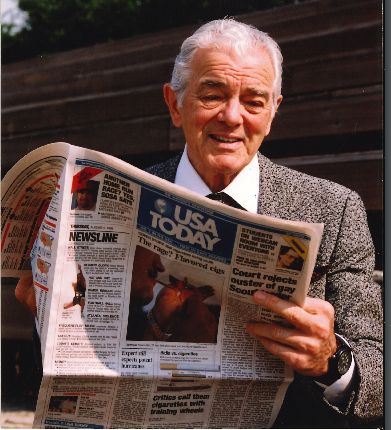
Previously published at WGBHNews.org.
In his book “The Inevitable,” the technology journalist Kevin Kelly writes, “The future happens very slowly and then all at once.” That seems like as good a description as any of what’s going on at GateHouse Media, the nationwide chain that owns more than 100 newspapers in Greater Boston. After years of gradual contraction, the company is suddenly laying off journalists by the dozens and merging its smaller weeklies. In fact, you might say the future has arrived as quickly as one, two, three:
1. On May 23, word began to trickle out that massive layoffs were taking place at GateHouse papers around the country. A crowdsourced spreadsheet showed that two local dailies, The Providence Journal and Worcester’s Telegram & Gazette, were especially hard hit, losing about six journalists each (the Worcester numbers include Worcester Magazine, another GateHouse title). All told, the newspaper analyst Ken Doctor wrote for Nieman Lab, it looked like about 200 people would lose their jobs, offset slightly by the addition of 30 investigative and regional positions.
2. On May 30, The Wall Street Journal reported that the giant Gannett chain, best known for publishing USA Today, had held merger talks with GateHouse after earlier fending off a hostile acquisition attempt by MNG Enterprises, the hedge fund-owned group formerly known as Digital First Media. As I wrote earlier this year, Gannett is a slightly better steward of local journalism than MNG, although it has decimated properties such as Vermont’s Burlington Free Press.
3. The next day, on May 31, I obtained a confidential memo from GateHouse New England executives informing the troops that 50 of the company’s Greater Boston weeklies would be merged into 18. Although the memo said there would be no reduction in coverage, venerable titles such as the Danvers Herald and the Ipswich Chronicle will pass into history.
In many ways it felt like the end game was at hand, even if no one knows quite what that will look like. Kirk Davis, chief executive officer of GateHouse and chief operating officer of its parent company, New Media Investment Group, expressed optimism when I contacted him, though he noted the seriousness of the situation.
“We remain positive about the future for local media but certainly acknowledge that the business model for community news is under pressure,” he said by email.
The turmoil has reached the upper echelons of GateHouse and New Media. The Boston Business Journal’s Don Seiffert reported two weeks ago that New Media’s shareholders recently rejected a compensation plan that had paid Davis $1.7 million in 2018. Share prices are down, and New Media chairman Wesley Edens has been replaced by Mike Reed, the company’s chief executive.
If the future is murky, the history is clear enough. I’ve been following the devolution of local newspapers into chain ownership for more than 25 years. I also worked briefly in 1990 for North Shore Weeklies, one of GateHouse’s predecessor regional chains. It’s a story of combining more and more newspapers in a desperate attempt to achieve economies of scale sufficient to offset the overall decline of the newspaper business. It hasn’t worked, and there is little evidence that it ever will. But it has not been for lack of trying.
Our tale begins in the 1960s, when enterprising newspaper publishers built about a half-dozen regional chains in Greater Boston. Starting in the late 1980s and early ’90s, Fidelity Capital, an arm of the investment giant, assembled many of these groups into what became Community Newspaper Co. Among the executives who passed through CNC was a young Kirk Davis, who did a stint as president and publisher.
In 2001, Fidelity cashed in by selling CNC for an estimated $150 million to Pat Purcell, then the owner and publisher of the Boston Herald. Purcell, perpetually challenged financially, turned around five years later and sold CNC to the company that would become GateHouse for a reported $225 million. At the same time GateHouse bought The Patriot Ledger of Quincy, The Enterprise of Brockton, and their associated weeklies for another $165 million. Davis had been running those papers, so the acquisition brought him back into the fold.
In 2008 I wrote about GateHouse for CommonWealth Magazine. By then Davis was president and publisher of the New England division. The company was laying off journalists, continuing a trend begun under Fidelity and Purcell. But Davis, ever upbeat, hoped GateHouse could get ahead of the curve.
“We feel that community newspapers have a very viable future and, juxtaposed against the trend overall, are performing very well,” Davis told me at that time. “I believe in it, and I believe it’s going to stay strong.”
Five years later, GateHouse went into bankruptcy, only to emerge within a few months. Since that time the company has continued to build its empire while shrinking its reporting corps.
Like many observers, I’ve been harshly critical of GateHouse’s cost-cutting measures, which in many cases have left its newspapers without the resources to meet the information needs of their communities. Newspapers in general are an endangered species. But when a chain takes on debt to keep buying more properties and extracts revenues from its individual papers in order to satisfy shareholders, there is simply less money available for journalism than there would be with independent ownership.
At the same time, it’s important to acknowledge that there is a difference between GateHouse and, perhaps, Gannett — both of which seem to be intent on developing a long-term survival strategy — and MNG, which by all appearances is squeezing the last few drops of revenue out of its papers before walking away. (In Massachusetts, MNG, which is owned by the hedge fund Alden Global Capital, controls the Boston Herald, The Sun of Lowell, and the Sentinel & Enterprise of Fitchburg.)
“GateHouse does try — unlike Alden, for instance — to make small investments in some sort of a future,” Ken Doctor wrote recently. “Its digital marketing and events business investments are examples.”
In our recent email exchange, Davis emphasized steps that GateHouse has taken to move toward sustainability, including the outsourcing of design functions to a facility in Austin, “constant engagement and surveys,” newsletters, audio, digital storytelling, data-based investigative reporting, and more.
“In New England,” he said, “we’ve recently added a regional engagement editor and regional newsletter editor. We’re also recruiting a New England investigations editor with a high focus on data.”
Davis also touted the adoption of the Accelerator Team Model, which, in essence, involves trying to do a better job of defining audiences as well as the priorities, teams, and plans needed to serve those audiences.
I asked Davis about GateHouse’s decision to cut The Providence Journal’s newsroom just as The Boston Globe was gearing up with a new Rhode Island initiative. His answer: “While we regret any involuntary staff reductions, the layoffs last month had a small impact on local reporting. My personal view on competitive threats is this: the more any local media can invest in covering our country’s local towns the better, whether we are there or not…. We’ll compete with and celebrate expansive efforts in local news.”
I also asked where he imagines GateHouse will be five years from now. Davis: “My belief is that our industry will be digitally proficient in all aspects of serving our communities. Certainly there will be fewer ‘print-based’ publications. Much is written about the likelihood or necessity of consolidation in our industry. We are one of the larger groups and hopefully our scale and investments can prove beneficial to our industry. Bigger isn’t better though, better is better. That’s where we need to focus — always.”
My own view is that independent, grassroots news organizations are going to show the way. It won’t be easy, and some will fail. But in New England, nonprofits such as the New Haven Independent and VT Digger as well as locally owned for-profit newspapers such as the Berkshire Eagle and the Portland Press Herald are simply doing a better job of covering their communities than GateHouse, Gannett, or MNG.
Nevertheless, it looks like GateHouse or a permutation of it will be with us for some time to come. Given the importance of local journalism to democracy, we can only hope that Davis, Reed, and company figure out a way to stop the endless bleeding and start growing again.
Talk about this post at Facebook.





